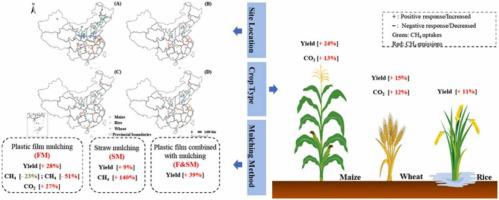Field Crops Research ( IF 5.8 ) Pub Date : 2022-05-18 , DOI: 10.1016/j.fcr.2022.108566 Huihui Wei , Feng Zhang , Kaiping Zhang , Rongzhu Qin , Wenjuan Zhang , Guojun Sun , Jie Huang

|
Food security and global warming in the 21st century are two major challenges for agricultural development. Soil mulching either with plastic film or straw is a common agricultural practice, which can improve crop growth by reducing evaporation and regulating soil temperature, and is widely applied globally. Although soil mulching can significantly affect crop yield and greenhouse gas (GHG) emissions, there is controversy regarding its effect on crop yield and GHG emissions in the long run. We conducted a meta-analysis to explore the impact of soil mulching practices on maize, wheat, and rice yield and GHG emissions in China. Our results demonstrated that soil mulching improved crop yield (16 – 22%), and its impact on GHG emissions varied with crop, region, and mulching method. Plastic film mulching (FM) and straw mulching (SM) increased yield by 28% and 9% compared with no-mulching (NM), respectively. FM decreased methane (CH4) emissions in paddy by 51%, and CH4 uptakes in upland by 23%, but SM increased CH4 emissions in paddy by 140%. Soil mulching increased carbon dioxide (CO2) emissions of maize and wheat by 13% and 12% than NM, respectively. CO2 emissions under FM decreased when ATP > 911.8 mm and AMT > 15.6 °C. N2O emissions under soil mulching may be reduced when nitrogen input is greater than 144 kg N ha−1. This showed that the reasonable use of soil mulching has the potential to achieve a win-win strategy to ensure food security and mitigate climate change.



























 京公网安备 11010802027423号
京公网安备 11010802027423号